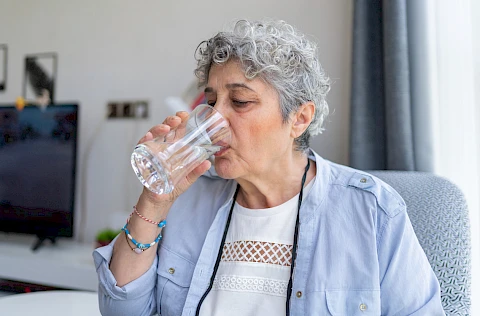
November is Bladder Health Month, a perfect opportunity to focus on a critical aspect of senior health. Maintaining good bladder health is essential to overall well-being and quality of life for seniors. As we age, various changes can affect how our bladder functions and these changes can be especially prominent in older adults. Caregivers should help ensure their loved ones maintain healthy bladder habits.
More About Senior Bladder Health
Seniors often face specific bladder health challenges in the natural aging process. Common issues can include incontinence, urinary tract infections, and an overactive bladder. These conditions arise due to muscle strength, nerve function, and hormonal changes. It's crucial for caregivers to be aware of these potential problems and to support seniors in managing them effectively.
Maintaining Hydration
Proper hydration is a primary factor in maintaining bladder health. Drinking enough water helps flush out bacteria and reduce the risk of infections, but getting the right amount can be a balancing act. Encourage seniors to drink water throughout the day to stay hydrated. Provide water bottles that are easy to handle and offer hydrating foods like watermelon or cucumbers. However, you must also monitor fluid intake to prevent overhydration, which can lead to frequent urination.
Promoting Regular Bathroom Breaks
Establishing a routine can significantly aid bladder function. Encourage seniors to use the bathroom at regular intervals, which can help train the bladder and reduce urgency. Develop a bathroom schedule based on these intervals and create a comfortable bathroom setting with grab bars and raised toilet seats. Remind seniors not to hold urine for long periods as it can put unnecessary pressure on the bladder.
Managing Incontinence
Incontinence is a common issue among seniors, and it requires sensitive handling. Understanding the different types of incontinence, such as stress incontinence and urge incontinence, can guide caregivers in managing these issues effectively. Use protective pads and clothing designed for incontinence, and encourage pelvic floor exercises to strengthen bladder muscles. Consider incontinence products like absorbent underwear for convenience and comfort.
Encouraging Open Communication
Bladder health can be a sensitive topic, but open communication is necessary. Caregivers should approach the subject with compassion, allowing seniors to express their concerns without embarrassment. Start conversations about bladder health during relaxed moments and listen actively, reassuring seniors that these issues are common and manageable. Highlight the importance of consulting healthcare professionals if problems persist.
Get Help With Bladder Health From Senior Helpers Dover DE
Supporting senior bladder health is critical to their overall well-being and confidence. By focusing on hydration, encouraging regular bathroom breaks, managing incontinence, and promoting open communication, caregivers can make a significant difference in their loved ones' quality of life. Integrate these practices into daily caregiving routines and keep an eye out for any changes in bladder health that may require medical attention.
If you're a family caregiver looking for support, remember you don't have to navigate this journey alone. Contact us at Senior Helpers Dover DE for professional caregiving assistance in Lewes, Georgetown, Middletown, Seaford, and Dover. Let’s make senior bladder health a priority year-round, not just in November.